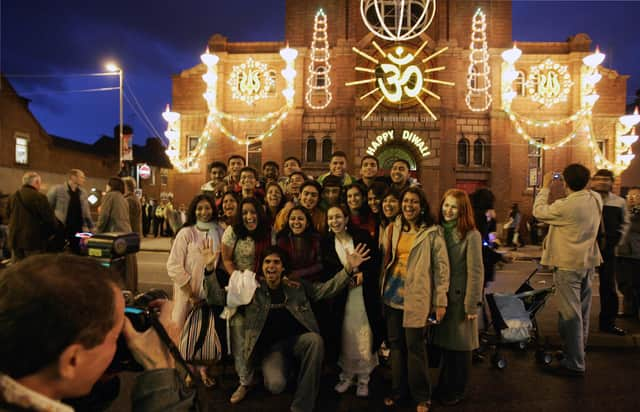Diwali 2023: when is Diwali, what is it, UK date, ideas for celebration and activities in Leicester and London
and live on Freeview channel 276
Hindus, Sikhs, Jains and Buddhists around the world are preparing to celebrate Diwali, an annual religious festival.
The five days of Diwali take place every year in Autumn, between October and November, but the specific dates change year-on-year. Celebrations, however, remain the same. It commences after the end of harvest to coincide with the new moon.
Advertisement
Hide AdAdvertisement
Hide AdIt may also be a religious festival, but Diwali offers universal messages which are appreciated by all people, regardless of their faith. The themes of the festival are around friendship, peace and goodwill. For this reason, it’s celebrated by billions of people around the world.
So, just what is Diwali, when is the 2023 date, what do people do to celebrate and what activities can you enjoy? Here’s what you need to know.
What is Diwali?
Diwali is a Hindu festival of lights which is also celebrated in other Indian religions, such as Sikh, Jain and Buddhist. It symbolises the spiritual victory of light over darkness, good over evil, and knowledge over ignorance. Also known as Deepavali, which means 'rows of lighted lamps', or the 'Festival of Lights', the festival also symbolises hope over despair.
For Hindus, Diwali marks the start of the New Year, and also the start of winter. It honours Lord Rama and his wife Sita returning to their kingdom of Ayodhya, following Rama and Hanuman’s successful efforts to rescue Sita the demon King Ravana.


When is Diwali 2023?
Advertisement
Hide AdAdvertisement
Hide AdThis year, the main Diwali Day will be on Sunday 12 November.
How can I celebrate Diwiali?
People traditionally celebrate Diwali by attending religious ceremonies in holy temples and putting up decorations in their homes such as bunting and small oil lamps called diyas. They also spend quality time with family and friends, feast on delicious food including samosas and traditional sweets called mithai, set off firework displays, dress up in ornate clothing and exchange gifts with loved ones.
What are the five days of Diwali?
There are typically five days of Diwali, and each one has its own meaning and significance. These can vary depending on the individual religions. The first day marks the start of Diwali, and is dedicated to the worship of Goddess Lakshmi who provides prosperity. On the second, there is a focus on abolishing evil and the Goddess Kali is worshipped.
The third day, known as Diwali Day, sees the lighting of diyas in homes and temples, and fires are also fireworks are set off. This is how Diwali gets its name as ‘the festival of lights’. This is also the day when people dress in their best clothing, eat meals together and exchange gifts.
Advertisement
Hide AdAdvertisement
Hide AdThe fourth day is the start of the New Year, known as Nutan Varsh. The fifth day is an important celebration of the relationship between brothers and sisters. People often seek blessings from Lakshmi and Lord Ganesha, the remover of obstacles.
The Jains observe their own Diwali which marks the final liberation of Mahavira. The Sikhs celebrate Bandi Chhor Divas to mark the release of Guru Hargobind from a Mughal prison. Newar Buddhists, unlike other Buddhists, celebrate Diwali by worshipping Lakshmi, while the Hindus of Eastern India and Bangladesh generally celebrate Diwali by worshipping the goddess Kali.
What activities are taking place around the UK?
There are lots of different activities taking place across the country in recognition of Diwali, including in London and Leicester.
Diwali in Leicester
One of the most eagerly anticipated celebrations is in Leicester, where the festivities are believed to be the largest outside India. This year marks the 40th anniversary of the first Diwali lights switch-on in the city.
Advertisement
Hide AdAdvertisement
Hide AdDiwali activities began on Sunday 29 October with the annual light switch-on followed by a spectacular firework display on Belgrave Road, known as the Golden Mile. The celebrations will continue on Diwali Day on Sunday 12 November, on Belgrave Road and also Cossington Recreation Ground, between 3pm and 9pm. There will be a Diwali village which will feature food stalls, funfair rides, lantern processions, music and dance, and also a firework display.
The Leicester Wheel of Light has also returned for Diwali, located on Belgrave Road, and can be enjoyed until 12 November. For more information on Leicester's Diwali celebrations, there's a Diwali guide on the Visit Leicester website.
Diwali in London
There are several Diwali celebrations in the capital city. One of the main ones is in Trafalgar Square. Diwali on the Square which has already taken place this year, saw hundreds of Londoners gather in Trafalgar Square to celebrate the festival of lights. Visitors to the event, which took place on Sunday 29 October, enjoyed an exciting lineup of music and dance, plus workshops, food, art and crafts for the whole family.
There are several other events taking place in London up until, and including, 12 November. For a full list of events, please take a look at the five London events to celebrate the festival of lights article, written by our sister title LondonWorld.
Comment Guidelines
National World encourages reader discussion on our stories. User feedback, insights and back-and-forth exchanges add a rich layer of context to reporting. Please review our Community Guidelines before commenting.
